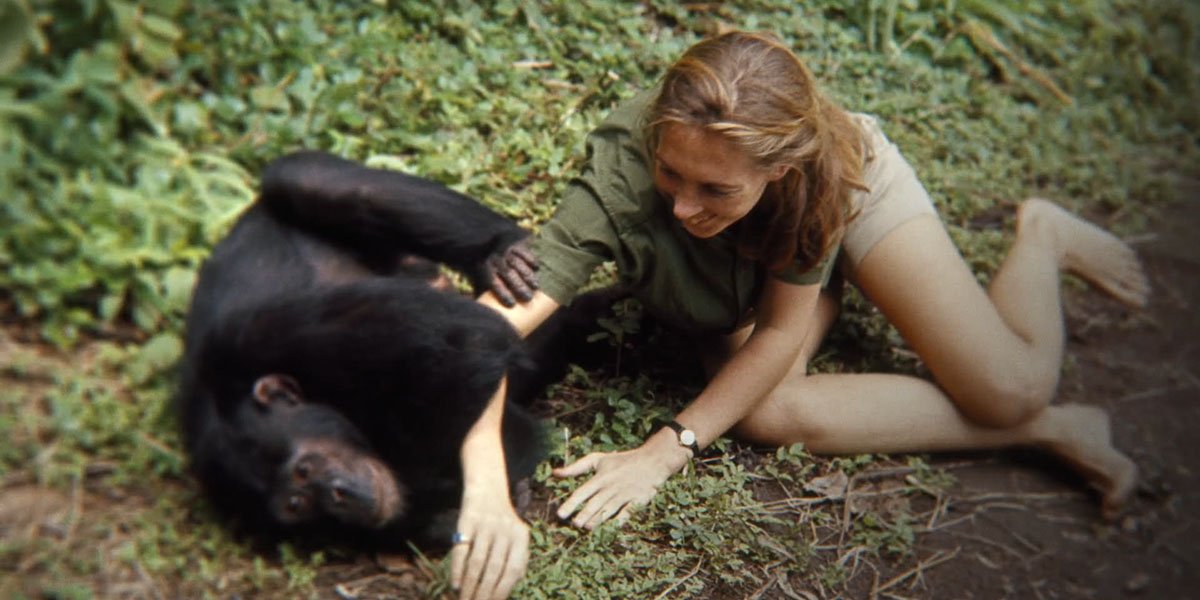
JANE
Abramamora
Director: Brett Morgen
Written by: Brett Morgen
Cast: Jane Goodall, Hugo van Lawick
Screened at: Critics’ link, NYC, 10/5/17
Opens: October 20, 2017
Women are often not treated as well as men in the work force. They are paid less for the same job and have a tough time breaking through the glass ceiling, as the Forbes list of America’s mostly-male CEOs will confirm. One area not usually thought of as a male-dominated sphere is nature study. In the Gombe National Park are of Tanzania one brave British woman challenged the all-male heritage. Jane Goodall was a twenty-six-year old secretary when she took on a formerly male preserve, chosen by David Leakey, a paleontologist born in Kenya. He was looking to Goodall not because she had the best training for the job of observing chimps in the wild but because she was untrained. She was not burdened with the hard knowledge that students in the universities acquire but conversely, because she had no experience in this area (she could not afford university tuition), she would have an open mind. Leaky was looking for someone who loves animals and had a great deal of patience, inspired by the thought of getting insights into how our Stone Age ancestors lived and thought hundreds of thousands of years ago. The chimpanzee communities in East Africa would supply clues. Her decades spent in East African provided the National Geographic and the scientific community at large with breakthroughs, perhaps the leading one being that chimpanzees knew how to fashion tools for their specific needs, particularly sticks that could reach into the ground to pick up bugs for their dining pleasure.
And patience comes across as the leading quality, as Goodall had to allow a chimp community in the Gombe to get accustomed to her so they would lose their fear of perhaps the only human being they had seen day after day for a month. As they accepted her as part of their community, they even had the chutzpah to sneak into her tent and steal bananas when she was away, later moving on to try to open cases to satisfy their curiosity. Goodall found that she could construct a simple device, fill it with bananas, so the chimps would not have to destroy the human property.
Though accustomed to a solitary life, holding that she was experiencing even greater than her most passionate dream, she became accustomed in 1962 to the inclusion of a male photographer, Dutch citizen Hugo van Lawick, who, in one of the most romantic proposals in modern times (by telegram) asked her to be his wife. Like the animals who surrounded them, the two human beings had their own baby named Grub, brought up until his school age of six in Tanzania. We observe the little one smiling, laughing, playing with the chimps, and having a better education than he could have received in some stuffy London school.
The chimp community did not function in a blessed state of nature always. Tragedy struck when a polio epidemic caused at least one adult chimp to lose function of two legs and one arm, his suffering ended when Goodall has it shot. Further, in a rare display of hostility, the chimp community is wiped out.
The photography, saturated color something like the earlier Technicolor pictures, gives further authenticity to the project. As a nature film, this is best seen on the big screen where mountains and valleys, streams and waterfalls, make this part of Africa to look like paradise—especially when contrasted with the soulless office buildings and auto traffic of London. Philip Glass provides marvelous, emotional music as the film is edited from 140 hours of stock to its current hour and a half. The only parents who might be wary of taking their small fry to this glorious movie are those who for some antiquated reason believe that small boys and girls should be protected from seeing animals coupling. In one scene, a female of the species stands quietly allowing a host of males to mate, while in another area, predators are observed catching and killing their prey.
Los Angeles-born writer-director Brett Morgen, whose resume includes sixteen films including “Say it Loud: a Celebration of Black Music in America,” jumps frequently back from the action to interview Jane Goodall. You may marvel at her lack of pretension. Now 83, she still enjoys a life worth living, one of those rare people who followed their dreams and had their wildest fantasies come strikingly into reality.
Rated PG. 91 minutes. © Harvey Karten, Member, New York Film Critics Online
Comments, readers? Agree? Disagree? Why?
Story – A-
Acting – A-
Technical – A
Overall – A-





